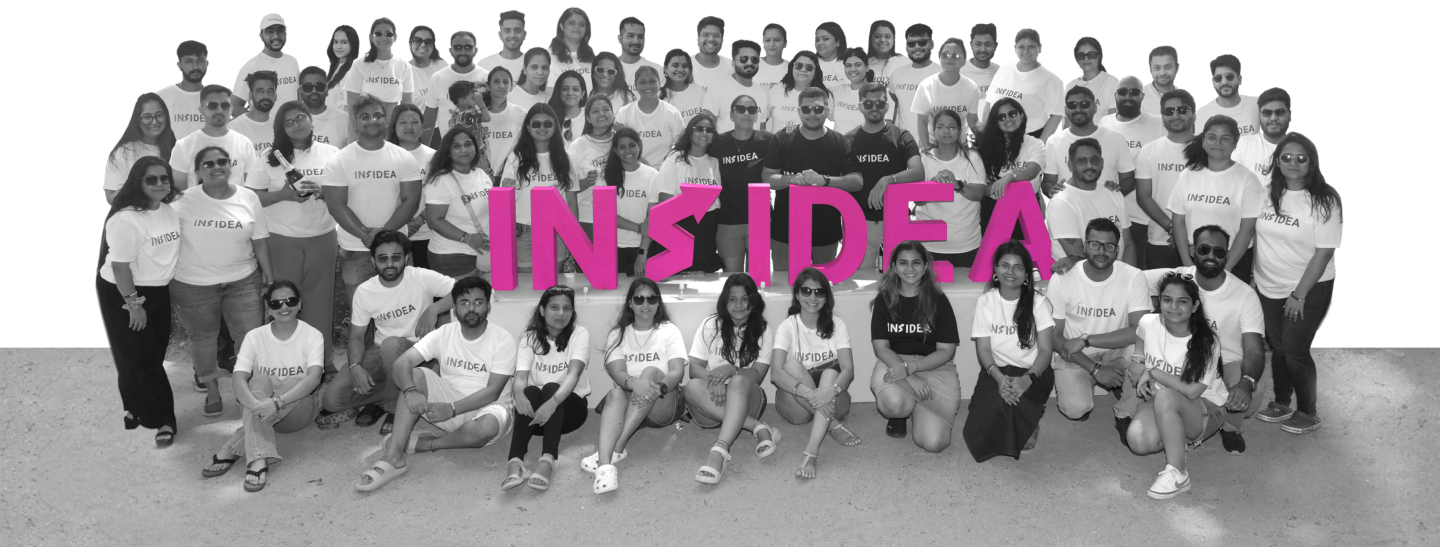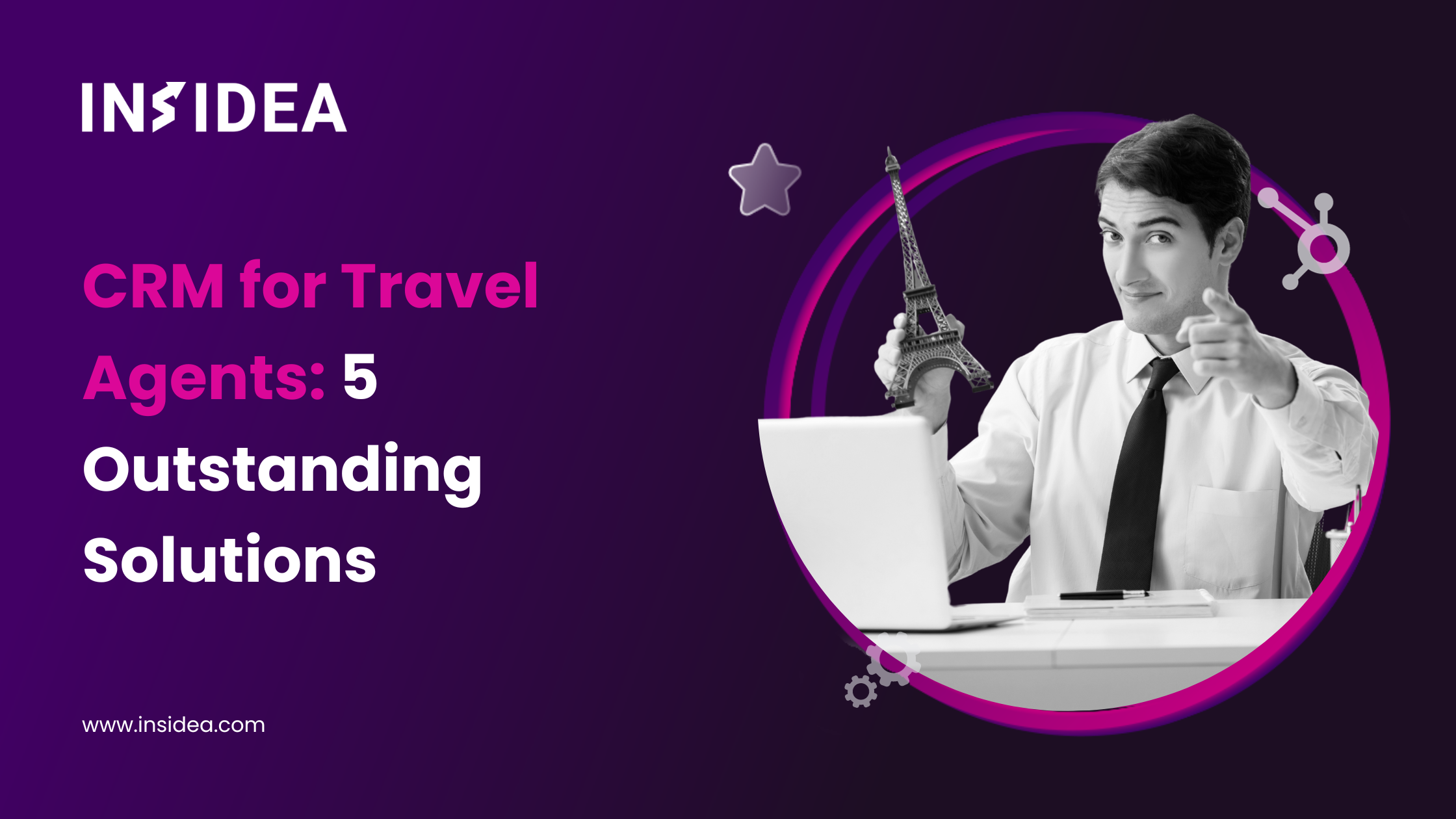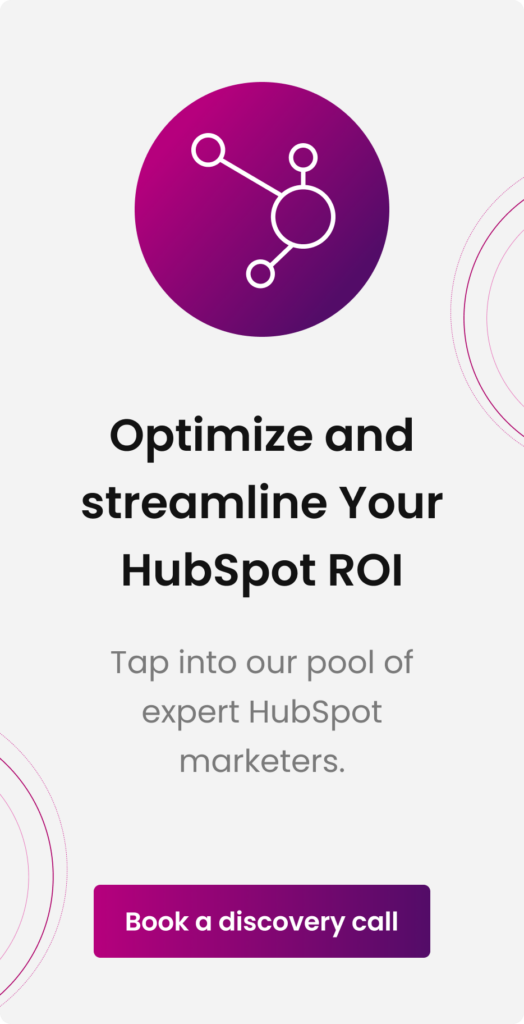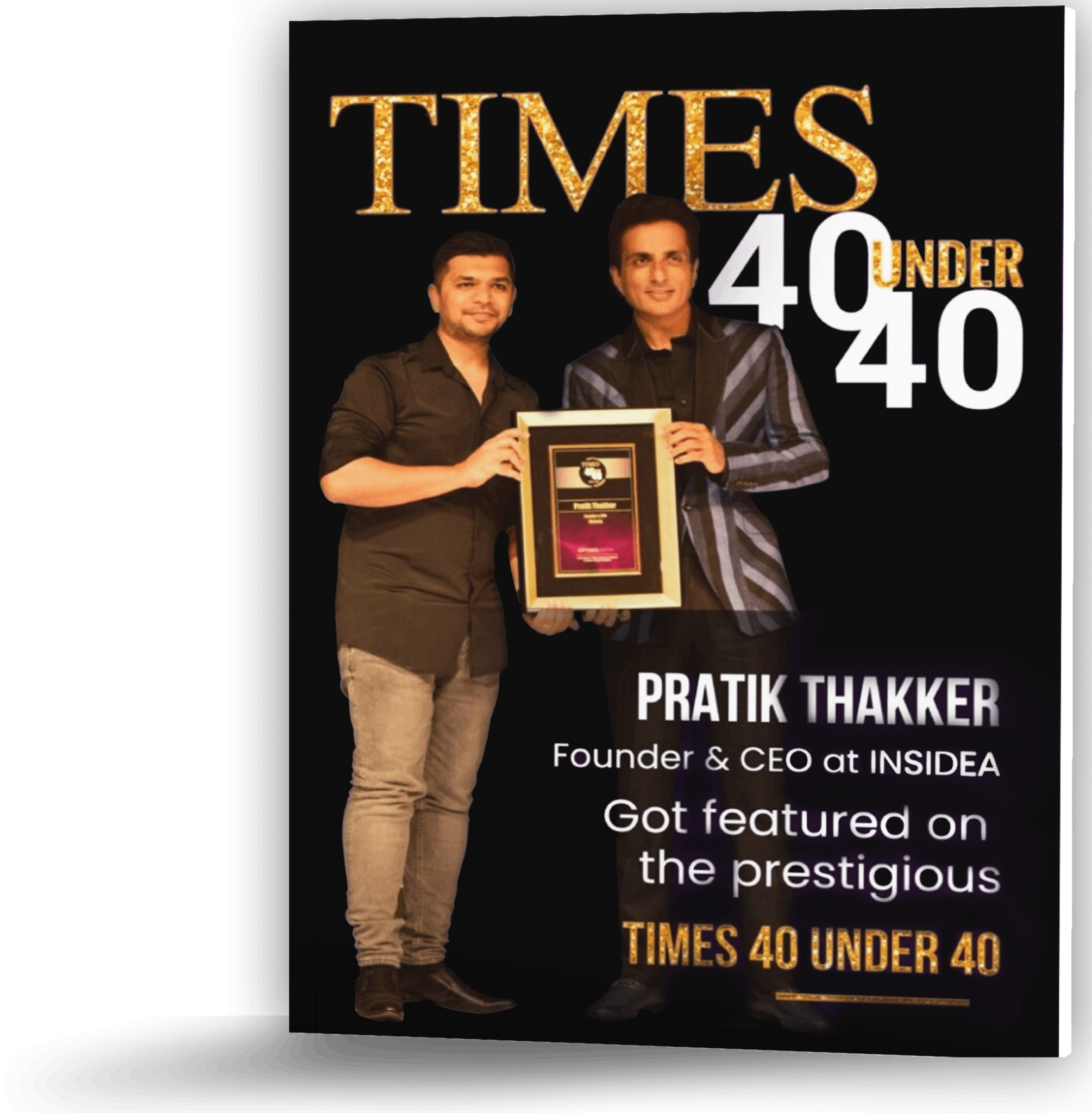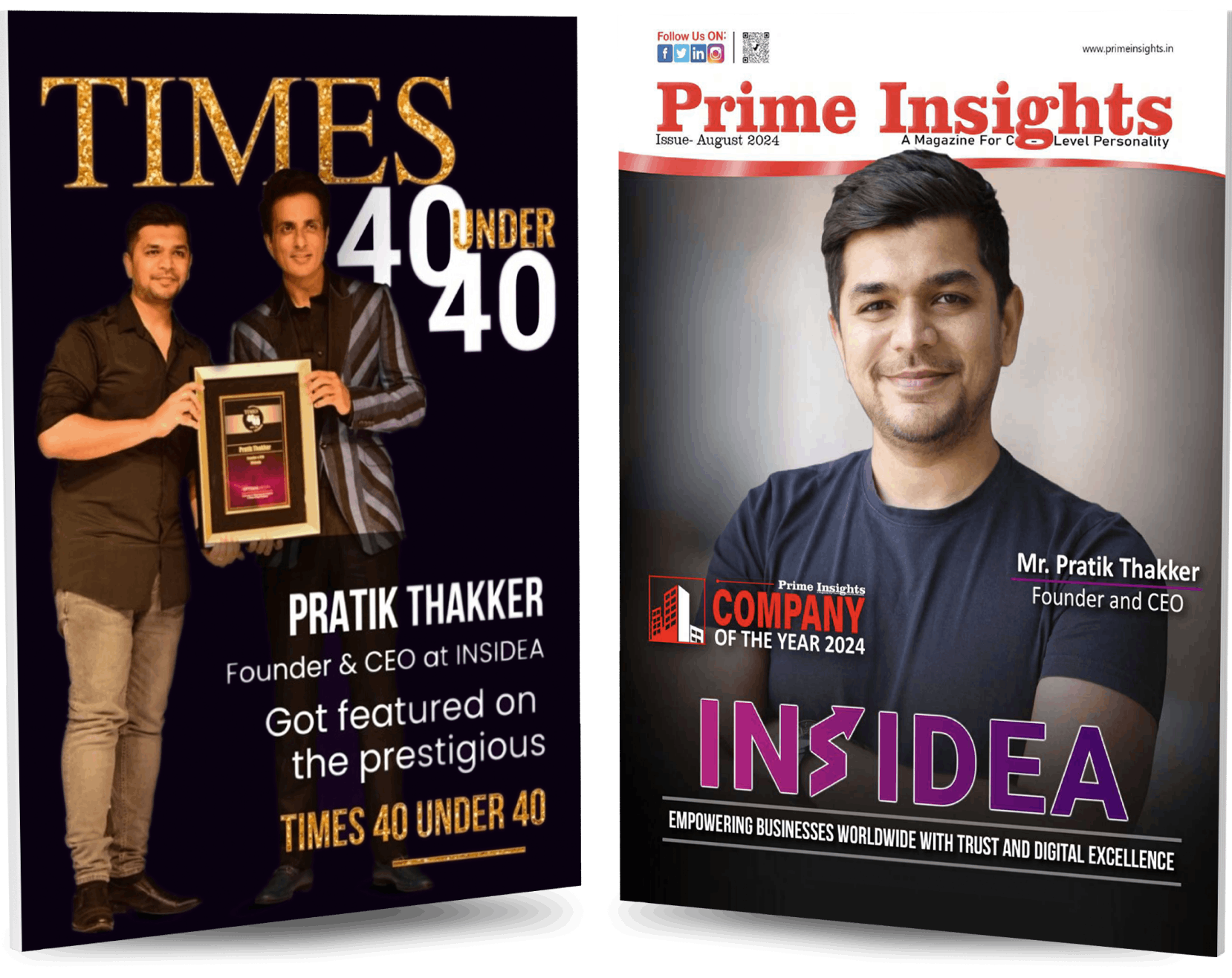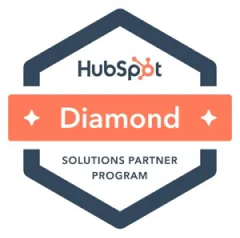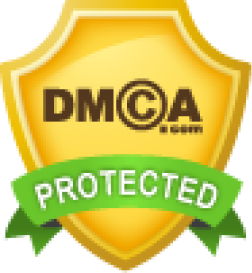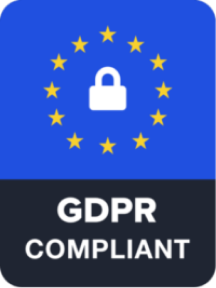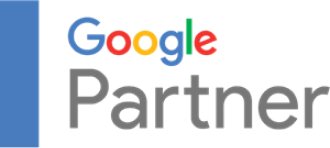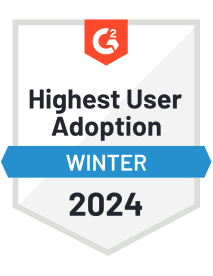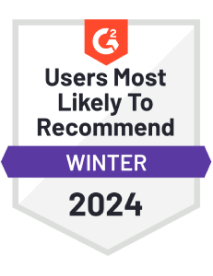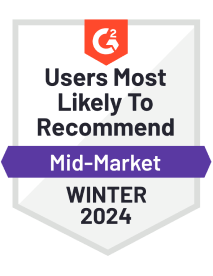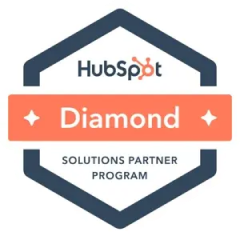If you’re part of a travel agency, you’re likely familiar with the challenges of providing seamless travel experiences while juggling complex operational details, especially in the post-Covid world. Gone are the days when managing customer data through scattered Excel sheets or endless email threads was enough. Today’s travel business demands a more efficient and robust approach.
CRM for travel agents has become indispensable in today’s travel industry, transcending the traditional role of a mere customer database. This comprehensive tool revolutionizes how travel agencies interact with and serve their customers.
From automating workflows to providing valuable marketing insights, a well-implemented CRM system can be the key to offering memorable travel experiences that distinguish your agency in a competitive market.
In this blog, we will dive into the top 5 CRM for travel agents, each offering unique features and capabilities that cater to the diverse needs of this dynamic industry. We’ll explore its benefits, key features, and what you should consider when choosing the right CRM software for your agency.
What Exactly is a CRM for Travel Agents?
A CRM for travel agents is a software that aims to assist travel agents in streamlining their daily responsibilities. There are two distinct CRMs for travel agents that are used by them:
- B2B
- B2C
Travel companies collaborating with partners, resellers, and other travel agents utilize a B2B travel CRM. This form of travel CRM is designed exclusively for business-to-business interactions and updates.
B2C Travel CRM is designed for travel companies that deal primarily with individual travelers (as opposed to agencies or other businesses). Using a B2C travel CRM ensures travelers receive notifications and alerts throughout their voyage. This simplifies this procedure for the travel agent’s benefit.
CRM is software that helps travel companies, such as travel agents, tour operators, destination management companies, activity operators, and hotels, improve sales and customer retention by having quality conversations with prospects and customers.
Essential Features Every CRM for Travel Agents Must Have
In the complicated travel business, where details are important, and customer satisfaction is the key to success, ensuring your operations run smoothly is not just a nice thing to do—it’s a must.
The right CRM software is the glue that holds everything together, from planning a trip to getting comments after it. But not every CRM system is the same. It’s essential to look for key features that are made just for the travel industry. This ensures a holistic approach to managing customers, streamlined processes, and proactive problem-solving.
Let’s look at what features CRM for travel agents should have to achieve all these benefits:
- Pre-trip Planning Capabilities
An efficient travel CRM should offer a holistic platform where agents can seamlessly plan and monitor bookings, from flights and accommodations to meetings and events. To prevent missing out on crucial details, the CRM should allow users to collate all reservations in a singular, easily accessible location.
- Post-trip Follow-up Tools
After a trip concludes, the CRM should be able to send automated follow-up communications, ensuring clients recall their experiences and are encouraged to provide feedback. These tools should enable travel agents to promote special deals or discounts, fostering a loyal clientele base.
- Enhanced Customer Service Functionality
To ensure consistency in service, the CRM should maintain detailed and suitable profiles of each customer, collating all their information and preferences. By analyzing customer data, the CRM should be able to anticipate potential concerns or issues, enabling travel agents to address them in advance.
- Sales Pipeline Management
Track potential clients and business opportunities from initial interest to sale completion, clearly showing business prospects. The CRM should offer intuitive tools that help agents understand the readiness or hesitancy of a potential client, ensuring timely interventions.
- Integrated Calendar System
To avoid scheduling conflicts and maintain organization, an ideal CRM should flawlessly integrate with prevalent calendar systems like Google Calendar. This feature ensures agents can simultaneously keep tabs on diverse events, from client meetings to internal team gatherings.
Additional Mention: B2C White Label Integration
For businesses aiming to scale, integrating with B2C white-label travel portals can be invaluable, expanding their service offerings and boosting their market presence.
In selecting a CRM for travel agents, ensuring it possesses these essential features will significantly enhance operational efficiency and customer satisfaction.
The Advantages of Using CRM for Travel Agents
Customer relationship management software has proven to be a pivotal tool for travel agencies, effectively bridging the gap between customer expectations and agency deliverables.
Beyond contact management, a well-integrated CRM system can elevate the customer journey from first contact to post-trip feedback.
Let’s explore the benefits of CRM for travel agents and how these advantages can seamlessly translate into achieving the agency’s overarching objectives.
1. Streamlined Internal Productivity
Efficiency is critical to managing the intricate demands of travel planning. CRMs facilitate smoother internal processes, especially those integrated with project management tools. Workflow templates allow teams to standardize and optimize operations, ensuring comprehensive task coverage without redundancies.
Automation and task dependencies ensure sequential execution, enabling management to focus on oversight rather than micro-management.
2. Centralized Cloud-Based Database
Remote and on-site teams can access uniform data, ensuring consistent information across all touchpoints. Real-time updates prevent double bookings and ensure immediate information retrieval. Enhanced security protocols ensure data integrity and safety, including data backups and two-step verification.
3. Targeted Sales Initiatives
Segment clients for more precise and personalized sales approaches. Automated lead categorization and email drip campaigns allow for a balance between scale and personalization. Customizable email content and A/B testing refine communication strategies for better conversion rates.
4. Informed Marketing Campaigns
Feedback-driven data helps shape marketing direction, ensuring relevance and increased ROI.
Detailed client feedback forms provide insights directly into CRM, allowing agencies to understand and address client needs and preferences.
5. Improved Client Retention
A detailed client history enhances personalized interactions, fostering trust and loyalty. Regular follow-ups and loyalty programs incentivize repeat business and create a sense of exclusivity for potential clients.
6. Enhanced Customer Service
Centralized client data ensures informed interactions, irrespective of which agent handles the query. 24/7 multilingual contact centers assist, ensuring clients are never left stranded or uninformed.
7. Performance Analytics
Data-driven insights help identify areas of strength and potential improvement. Customizable analytics fields enable agencies to track specific metrics, from upsells to individual agent performances.
Incorporating a CRM for travel agents can be transformative, optimizing both front-end client interactions and back-end operations. Embracing these benefits ensures satisfied customers and a more efficient, informed, and agile business model.
How Does CRM for Travel Agents Function?
Travel agencies must deploy sophisticated tools to cater to their clientele better. CRM for travel agents exemplifies this approach. Custom-tailored to the unique demands of the travel industry, such software facilitates enhanced customer experiences by streamlining operations, ensuring attention to detail, and fostering deeper client relationships.
Here are some steps involved in working with this software
| Step | Description | How to do it |
| 1. | Client Profiling | Create unique profiles for each traveler, including personal identification, preferences, past travel history, and special requirements. Centralize information for accessibility and personalized service. |
| 2. | Reservation Management | Link bookings for flights, accommodations, or tours to the client’s profile. Provide a consolidated view of the itinerary for easy management and updates. |
| 3. | Historical Data Analysis | Accumulate data from each traveler’s journey to identify patterns, anticipate needs, and make tailored recommendations. |
| 4. | Streamlined Inquiry Handling | Quickly retrieve a client’s profile for new inquiries to ensure timely and tailored responses based on past preferences and potential interests. |
| 5. | Booking Verification | Use the CRM interface for agents to review and verify all details of travel arrangements, minimizing errors and ensuring client specifications are met. |
| 6. | Integrated Communication Tools | Utilize CRM communication modules for sending booking confirmations, travel advisories, and personalized recommendations to enhance client communication. |
| 7. | Loyalty Programs and Promotions | Track and manage loyalty points, offers, and special deals to reward frequent travelers and incentivize repeat business. |
| 8. | Feedback Collection | Automate the collection of feedback post-travel to understand areas of excellence and potential improvement, enabling service refinement. |
By seamlessly integrating operations, communication, and client management, a CRM for travel agents empowers agencies to deliver unparalleled service. It reflects technological innovation and is a vital tool in crafting memorable and hassle-free travel experiences for every client.
The Top 5 CRM for Travel Agents
In the competitive world of travel agencies, having the right CRM software is crucial. It helps manage customer relationships, streamlines operations, enhances marketing strategies and ultimately contributes to exceptional travel experiences. Here are five of the best CRM solutions in the travel industry.
I. SalesForce

Source: Salesforce
- Customization and Scalability: Its customization extends to creating unique dashboards, reports, and customer interaction tools, ensuring that every aspect of the CRM aligns with your agency’s processes and growth trajectory.
- Advanced Analytics: The advanced analytics feature of Salesforce is a significant asset for travel agencies. It enables you to delve deep into customer data, uncovering patterns and preferences that can inform your marketing and service strategies. These analytics tools can track customer interactions, booking trends, and feedback, providing actionable insights that help personalize travel experiences and improve service offerings.
- Integration Capabilities: This integration streamlines multiple aspects of a travel agency’s operations, from email marketing platforms to booking systems and customer service tools. Such seamless integration ensures that all customer-related information is centralized, making it easier for your team to access and act upon this data, enhancing overall operational efficiency.
II. HubSpot
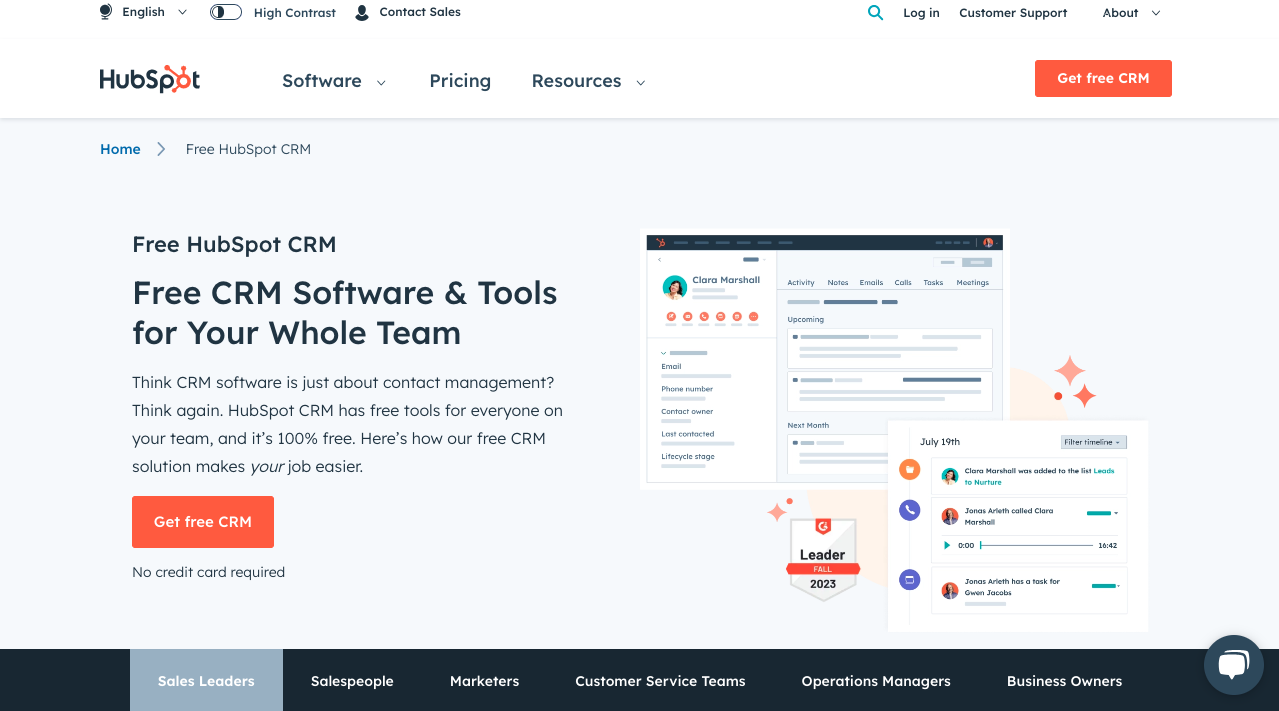
Source: HubSpot
- All-in-One Platform: HubSpot CRM is a comprehensive solution, offering an all-in-one platform encompassing marketing, sales, and customer service tools. It streamlines processes, ensuring that information flows seamlessly between different departments, from the initial customer inquiry to post-trip follow-up, enhancing the customer journey.
- Free Tier Available: This option allows agencies to use basic features without any upfront investment, making it an ideal choice for those testing the waters of CRM software. As the agency grows, HubSpot offers scalable plans, allowing businesses to add more advanced features and accommodate more users as their needs evolve.
- Intuitive Design: Its intuitive interface makes it easy for users, even those new to CRM software, to navigate and utilize its full range of features effectively. This ease of use reduces training time and increases adoption rates within the agency, ensuring that teams can quickly leverage the CRM to improve customer interactions and operational efficiency.
III. Zoho CRM
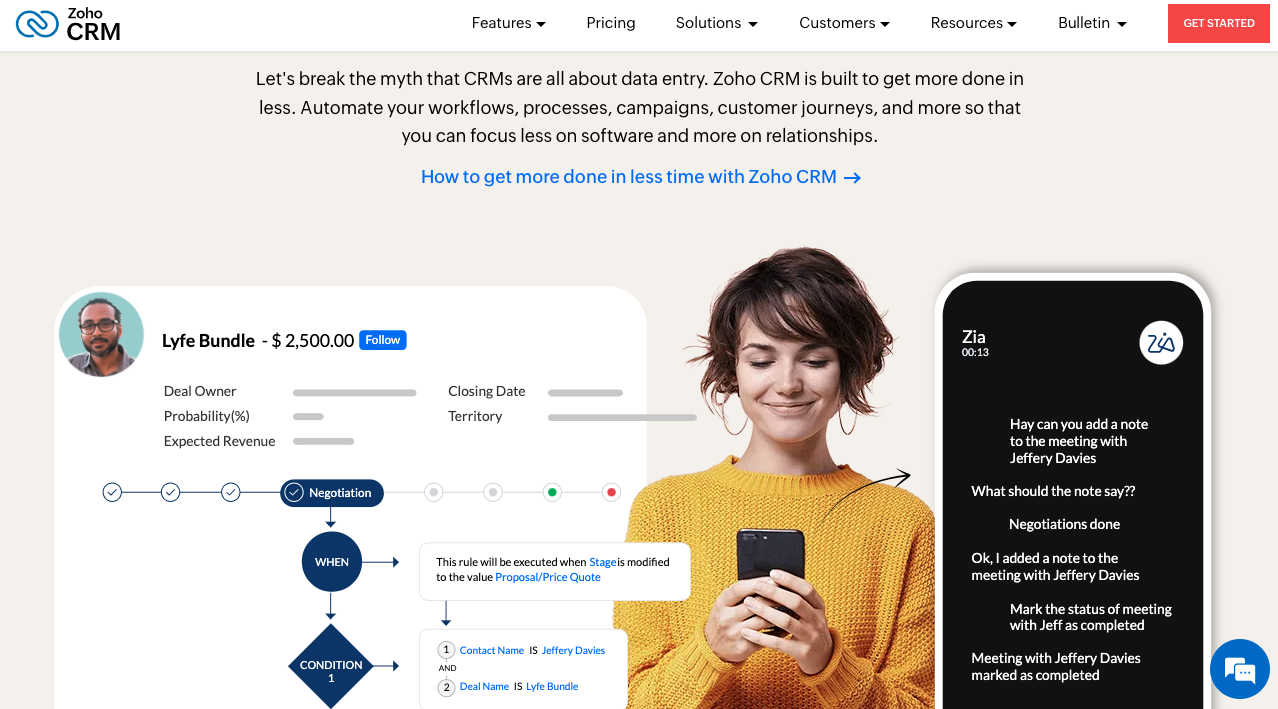
Source: Zoho
- User-Friendly Interface: The intuitive design ensures that all key features are easily accessible, making daily tasks like managing customer inquiries, bookings, and follow-ups more efficient and less time-consuming.
- Automation Features: The software significantly reduces the chances of human error by automating routine tasks such as lead management, follow-up emails, and booking confirmations. It frees up your staff to focus on more critical, value-added activities.
- Affordability: Budget constraints are often a key consideration for small to medium-sized travel agencies. Zoho CRM offers a cost-effective solution without compromising on functionality. Its pricing structure is designed to cater to smaller businesses, providing them with a powerful CRM tool that fits their budget.
IV. Microsoft Dynamics 365
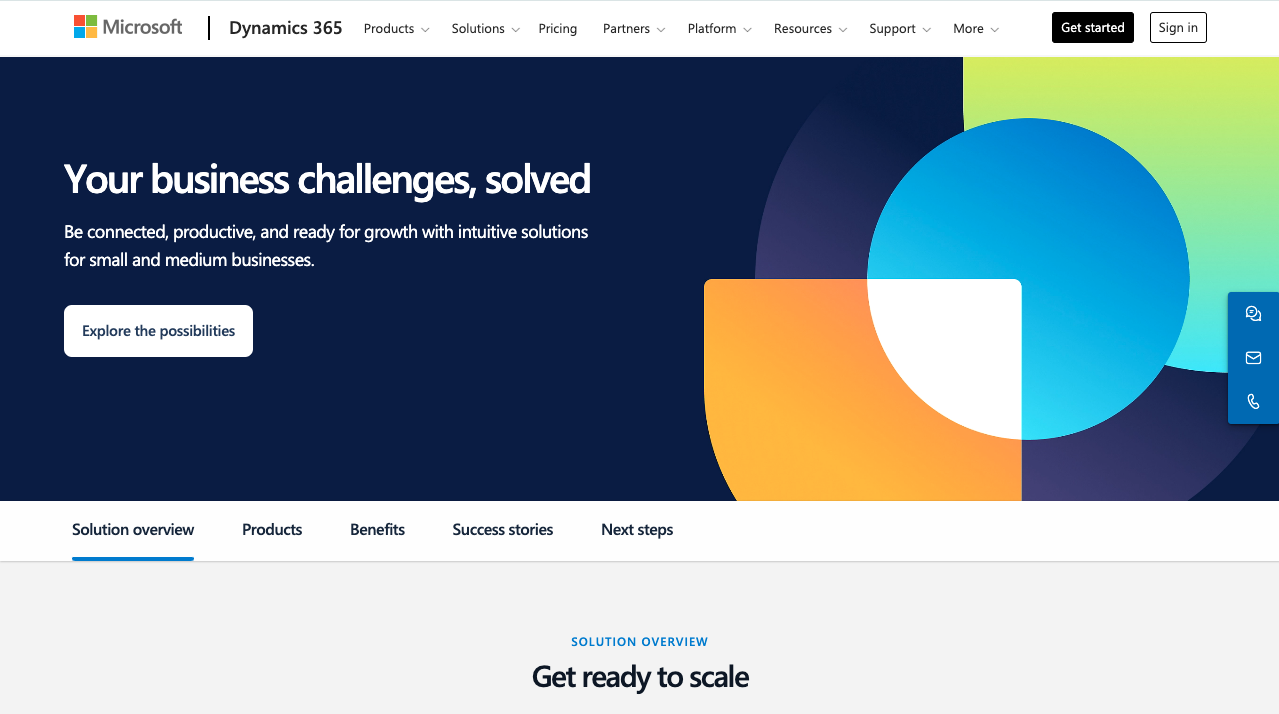
Source: Microsoft Dynamics 365
- Integration with Microsoft Products: This integration ensures a seamless workflow as employees can easily connect and utilize Dynamics 365 alongside other Microsoft tools they are familiar with.
- Customization and Flexibility: Whether it’s customizing dashboards, reports, or customer interaction channels, Dynamics 365 provides the flexibility to create a CRM solution that aligns perfectly with the agency’s operational processes and customer engagement strategies.
- AI Capabilities: AI features can analyze customer data and behavior, offering predictive insights to inform more targeted marketing campaigns, personalized travel recommendations, and proactive customer service, enhancing the overall customer experience.
V. PipeDrive

Source: Pipedrive
- Sales-Focused CRM: Its design revolves around streamlining and optimizing the sales process, making it easier for agencies to track leads, manage inquiries, and close deals. This focus on sales efficiency makes Pipedrive a powerful tool for agencies looking to boost their revenue through effective sales management.
- Visual Sales Pipelines: This feature allows agencies to visually track and manage customer journeys, from initial contact to final booking. The visual aspect makes it easier to understand where each customer is in the sales process, enabling agents to take timely and appropriate booking actions and improve conversion rates.
- Mobile Optimization: This mobile optimization ensures that agents can access and manage customer information, respond to inquiries, and update sales pipelines from anywhere. This level of accessibility enhances the agility and responsiveness of the agency, allowing them to provide prompt and efficient service to their clients.
In the dynamic world of travel management, adopting a suitable CRM system is not just a technological upgrade but a strategic necessity. Each CRM for a travel agent offers unique functionalities tailored to the diverse needs of the travel industry.
From enhancing customer engagement and operational efficiency to leveraging advanced analytics for strategic insights, these tools are pivotal in navigating the complexities of modern travel management.
As the industry continues to evolve, integrating a robust CRM system will be instrumental in ensuring travel agencies remain competitive, agile, and capable of delivering exceptional travel experiences.
Unlock Your Business Potential With Expert HubSpot Support!
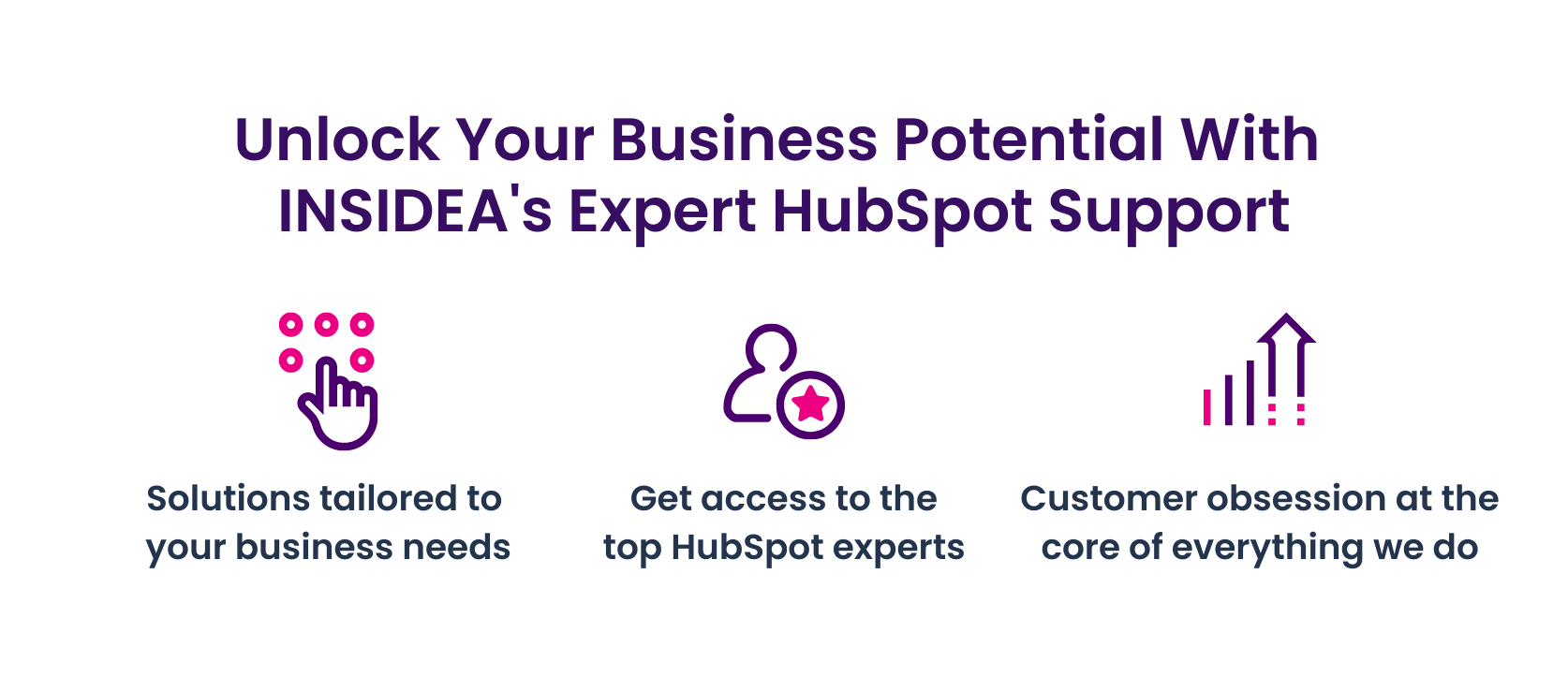
As a HubSpot Solutions Partner we take pride in assisting you with streamlining your HubSpot efforts. With our best-in-class marketing, sales, and service solutions, we help you scale exponentially.
INSIDEA’s HubSpot Specialists have the required in-depth knowledge and can provide you with expert guidance on how to use the platform to meet your specific business needs.
Get in touch today to learn more about how INSIDEA can help you succeed!
- Tailored Experience: For us, user experience is the primary focus. Thus, INSIDEA works with you to ensure your HubSpot experience is tailored to your business needs.
- Industry Expertise: Our team specializes in the setup, implementation, and optimization of HubSpot tools, as well as being well-versed in HubSpot best practices to ensure your business has the highest ROI possible.
- Customer Obsession: For us, customer satisfaction is the key to success, and we strive to ensure that our customers’ needs are not only met but exceeded every time.
At INSIDEA, we understand the importance of valuable HubSpot strategies that understand your target audience and drive conversions. Book a meeting with our HubSpot experts to explore how we can help you with your upcoming projects.
Get started now!


